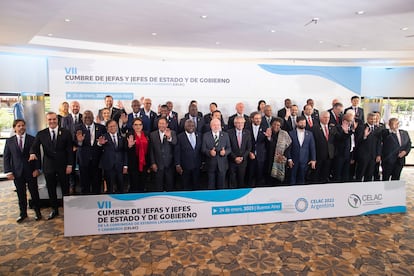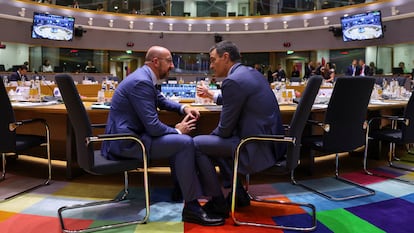Brussels identifies a hundred areas for investment in Latin America
Disagreement between EU and CELAC over Russia’s war in Ukraine is straining the first summit in eight years between the two continents

The European Union is striving to reactivate its relations with Latin America. The summit scheduled for Monday and Tuesday in Brussels between the EU and CELAC —the Community of Latin American and Caribbean States— will be a great opportunity for the two continents. As the EU seeks new trading partners in light of China’s push in Latin America and the lessons learned from its dependence on Russia in the energy sector, the EU-27 are courting the countries of Latin America and the Caribbean, one of the world’s largest raw material exporting regions. Brussels has already identified areas of investment through more than 100 specific projects, from one for the Bogotá metro to another on electric buses in Costa Rica, that can serve as spearheads to encourage European participation in the region, according to roadmaps that EL PAÍS has learned about.
However, there are disagreements between CELAC, a very diverse group of 33 countries that lacks structure, and the EU over whether and how to condemn Russia for its war in Ukraine in the final declaration of the meeting, and this is straining the first such summit in eight years, which also marks the kick-off of the Spanish presidency of the EU.
At a summit that includes the president of Brazil, Luiz Inácio Lula da Silva, and Colombia’s Gustavo Petro, participating states are preparing to announce investment programs in the region. To the €9,4 billion that Spain will contribute and the €10 billion from the European Commission to 2027, will be added announcements from other members such as Sweden (which is considering a contribution of €3.5 billion), the Netherlands (€2 billion) as well as Finland and Ireland (which are analyzing a more modest sum of around €50 million), according to European Community sources. And more is expected.
Leaders of the 27 EU Member States and the heads of state and government of at least 25 of the 33 CELAC countries will come to Brussels, according to diplomatic sources. Eight countries, including Mexico, will have ministerial representation. “The idea is to hold a summit that is as inclusive as possible,” said a senior EU source.
“Just the fact of holding the summit is already a diplomatic success. The EU and CELAC add up to a third of the United Nations countries. And it comes after almost a decade in which Latin America has not been on the European radar,” points out Javi López, MEP and co-president of the Euro-Latin American Parliamentary Assembly.
The idea is not to focus the summit on big economic announcements mirroring the meeting with African countries in which an investment of €150 billion was revealed in projects that in many cases were left unspecified, says a diplomatic source. There will be agreements signed on energy and other matters such as cooperation on digital or internal issues. The economic packages to be announced will take the form of loans and grants, and will go mostly to the European Global Gateway project, a tool created to mobilize resources for programs in developing countries. The aim of this project is to counteract the influence of China’s New Silk Road, Beijing’s major project to strengthen its position by expanding its trade relations with the entire planet. Twenty-one of the 33 countries in Latin America and the Caribbean have joined this project.
The EU has a lot at stake in Latin America, a region in which it is the main investor, but in which it has been losing ground to become the third largest trading partner —behind China and the United States—, and with which it maintains one of the the densest agreement networks in the world. To help identify projects of interest, which can encourage investment, the European Commission has prepared a report with over 100 projects ranging from programs to invest (partly private and partly public) in green hydrogen in Argentina, more sustainable transportation in Paraguay, digital and telecommunications projects in Colombia to achieve digital transformation, wind and solar plants in Cuba, and vaccine production in Mexico. It is not a financial operation, since it does not have associated funds, but rather seeks to be the beginning of many investments, diplomatic sources specify.

Political summit
It will be a very political summit that will last two days during which the leaders, in addition to participating in the plenary talks, will hold bilateral meetings. The format has aroused a lot of interest. In addition, a business forum with major European companies will be held in parallel.
The summit and the investment roadmap have been designed around a complex balance. It is clear that the EU has a strong interest in Latin America’s strategic raw materials - a region that has, among other things, large reserves of lithium - but the EU insists that it does not want to present itself as an extractive power, something against which leaders such as Lula da Silva and Argentina’s Alberto Fernandez have already warned. Civil society groups, such as the NGO Oxfam, have also criticized the fact that private investment is being prioritized.
Also on the table for the leaders on Monday and Tuesday in Brussels will be the agreement with Mercosur - the world’s fifth largest economic area outside the EU, comprising Brazil, Argentina, Uruguay and Paraguay, but which has run aground. It will be more feasible to launch the agreement with Chile (which only lacks a few details) and to renew the agreement with Mexico. At the same time, the EU is seeking to initiate a cooperation and association agreement with Colombia, which could be signed in the fall, according to EU sources, and which seeks to channel the dialogue between Brussels and Bogotá (which do not have an agreement).
The High Representative for Foreign Policy, Josep Borrell, will also sign memorandums of understanding with Ecuador, Honduras and El Salvador. In the case of Ecuador, eight priority areas are identified to “strengthen” relations, among which are the environment, the scientific and educational agenda, the migration agenda, the promotion of investments in certain green sectors or the cooperation agenda for Foreign Policy, according to the text to which this newspaper has had access. The memoranda with Honduras and El Salvador, where there are serious human rights violations, are more succinct and emphasize the intention to lay the groundwork for bilateral political dialogue through “regular consultations.”
The European and Latin American leaders are also seeking to set up a diplomatic relations body to make the relationship between the two blocs more fluid and to close the gaps for the next summit, which could be held in 2025 in Colombia. The EU has deeply neglected the region for eight years and is now trying to reverse the situation, as demonstrated by the diplomatic choreography in the form of trips to the region by the President of the European Commission, Ursula von der Leyen, of the European Council, Charles Michel, by the head of European diplomacy Josep Borrell, and by a good number of important commissioners. “The EU is back in Latin America,” Von der Leyen reiterated on her trips to Brazil, Argentina, Chile and Mexico.

Ukraine
However, disagreements over the condemnation of Russia’s large-scale invasion of Ukraine may greatly tarnish the meeting. The war launched by Vladimir Putin more than 500 days ago is not the focus of the summit, but it is the focus of all European meetings. And on this occasion, a group of countries – those most explicit in their support for Ukraine – wanted to highlight their condemnation of Russia in the harshest terms. This has clashed with the very diverse CELAC bloc, which is currently being chaired by Saint Vincent and the Grenadines, which belongs to the Commonwealth and to ALBA (Bolivarian Alliance for the Peoples of Our America).
The vast majority of the region has condemned the aggression and supported the United Nations resolutions, but within CELAC there are also countries that have not done so and continue to maintain strong ties with Russia (Cuba and Venezuela for instance). Others, like Brazil, reject the war, but do not share in the shipment of arms and seek to play a mediating role.
As of late Sunday afternoon, the final declaration of the summit was still being negotiated. And the main sticking point was Ukraine. In the first draft of the alternative declaration, there was talk of advocating for a “serious and constructive diplomatic solution” to the “conflict in Europe,” but even that wording did not find consensus within CELAC. In the latest drafts there is already talk of the war in Ukraine and the havoc it is causing, but there is disagreement because some countries do not want to include a reference to the UN declaration condemning Russia for the war of aggression, nor to demand the total withdrawal from Ukraine. The risk is that the gathering could end without a declaration, which in practical terms would not imply much, but in symbolic terms would mean a lot, since it would make visible big cracks between the parties.
Sign up for our weekly newsletter to get more English-language news coverage from EL PAÍS USA Edition
Tu suscripción se está usando en otro dispositivo
¿Quieres añadir otro usuario a tu suscripción?
Si continúas leyendo en este dispositivo, no se podrá leer en el otro.
FlechaTu suscripción se está usando en otro dispositivo y solo puedes acceder a EL PAÍS desde un dispositivo a la vez.
Si quieres compartir tu cuenta, cambia tu suscripción a la modalidad Premium, así podrás añadir otro usuario. Cada uno accederá con su propia cuenta de email, lo que os permitirá personalizar vuestra experiencia en EL PAÍS.
¿Tienes una suscripción de empresa? Accede aquí para contratar más cuentas.
En el caso de no saber quién está usando tu cuenta, te recomendamos cambiar tu contraseña aquí.
Si decides continuar compartiendo tu cuenta, este mensaje se mostrará en tu dispositivo y en el de la otra persona que está usando tu cuenta de forma indefinida, afectando a tu experiencia de lectura. Puedes consultar aquí los términos y condiciones de la suscripción digital.








































